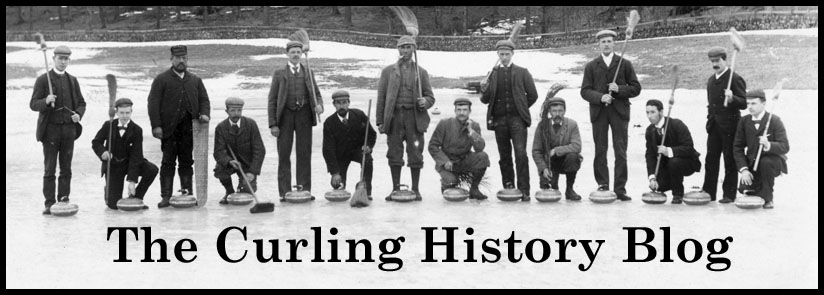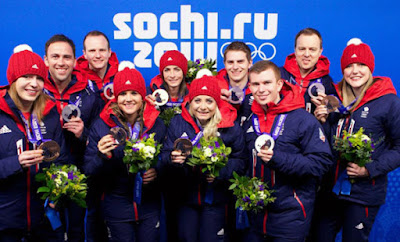1924
Following the success of the event, the International Olympic Committee decided, during their 1925 Congress in Prague, to hold similar winter events every four years, which would be known as Olympic Winter Games. The Chamonix International Winter Sports Week was then retrospectively recognised as the first Olympic Winter Games. Only three countries participated in the curling competition, which only involved men's teams. More about this competition, including who were the four 'reserves' on the GB squad, here, and the other teams involved here. The photo above is uncredited and comes from Les Jeux de la VIIIe Olympiade, Paris 1924, Rapport Officiel.
1932
Curling was a Demonstration Sport at the 1932 Olympic Winter games in Lake Placid, USA. There was no GB team. Indeed, only Canada and the USA took part, see here.
1988
Curling was a Demonstration Sport at the 1988 Olympic Winter Games in Calgary. GB was represented in the men's event by the team that won the Johnnie Walker Scottish Championship, as in the photo above. L-R: Robin Brechin (RCCC President), Hammy McMillan (3rd), David Smith (skip), Mike Hay (2nd), Rob Hermans (presenting the trophy), Peter Smith (lead), and the event sponsor! David Hay would be the team's 5th man in Calgary. Bill Smith was the team's coach/manager. The photo which appeared on the cover of the February 1988 Scottish Curler is not credited.
There was no GB women's team in Calgary in 1988, Team Scotland, on whom qualification depended, having failed to finish in the top eight at the 1987 Glayva World Championship in Lake Forest.
1992
Curling was again a Demonstration Sport at the 1992 Olympic Winter Games in Albertville, France. The venue for the curling was a four sheet rink at the resort of Pralognan-la-Vanoise.
The GB men's team was L-R: Hammy McMillan (skip), Norman Brown (3rd), Gordon Muirhead (2nd), Roger McIntyre (lead), with Bob Kelly (alternate). The photo, without Bob, is by Erwin Sautter and shows the team at the World Championship later in 1992.
The women's team was Jackie Lockhart (skip), Debbie Knox (3rd), Judith Stobbie (2nd), Wendy Bell (lead), and Isobel Torrance (alternate). That's the girls above, with their coach Peter Loudon, in a photo taken by Erwin Sautter that featured in the April 1992 Scottish Curler. L-R: Debbie, Peter, Isobel, Jackie, Wendy and Judith. Is there a better photo of the team anywhere?
1998
Curling became a full medal sport again at the Nagano Olympic Winter Games in 1998. The curling competition was held in the arena at Karuizawa, Japan.
Here is the GB men's team, (L-R) Douglas Dryburgh (skip), Peter Wilson, Philip Wilson and Ronnie Napier. James Dryburgh (not in the photo) was listed as the 5th player. Alex Torrance was the team's coach.
Here are the 1998 women L-R: Kirsty Hay (skip), Jackie Lockhart, Edith Loudon, Katie Loudon, and Fiona Bayne (5th). Coach was Jane Sanderson.
Both these photos were taken by Louis Flood and appeared in the February 1998, Scottish Curler.
2002
The GB women's squad at Ogden was skipped by Rhona Martin with Debbie Knox, Fiona MacDonald, Janice Rankin and Margaret Morton. Their team coach was Russell Keiller. This photo of the team, by Hugh Stewart, is from the 2001 European Championships at Vierumaki, Finland, and was published in the January 2002 Scottish Curler. L-R: Fiona, Debbie, Rhona, Margaret, and Janice.
Rhona's team won GOLD of course in Ogden. Her final stone can be watched here. The Scottish Sports Hall of Fame photo of the team is here.
2006
The curling competition at the 2006 Torino Olympic Winter Games was held in the Pinerolo Palaghiaccio, Pinerolo, Italy.
The GB men's squad was David Murdoch, with Ewan MacDonald, Warwick Smith, Euan Byers and Craig Wilson. Derek Brown was the coach. Photo is by Hugh Stewart and appeared in the March 2006 Scottish Curler.
2010
The curling competition at the 2010 Vancouver Olympic Games was held in the Vancouver Olympic Centre, Vancouver, Canada. The GB men's squad was David Murdoch (skip), Ewan MacDonald, Peter Smith, Euan Byers, and Graeme Connal. Coach was David Hay. In the photo above with sportscotland chair Louise Martin and Sports Minister Shona Robison and are (L-R) Euan, Ewan, David H, David M, Peter, and Graeme. This photo by Hugh Stewart featured in the February 2010 Scottish Curler. Here's another of the team in their curling gear.
The GB women's squad was Eve Muirhead (skip), Jackie Lockhart, Kelly Wood, Lorna Vevers, and Annie Laird (a late replacement for Karen Kennedy who was deselected late on in the process). Coach was Nancy Murdoch. Here's a photo of (L-R) Kelly, Lorna, Jackie, Eve and Nancy, with Shona Robison and Louise Martin. This photo by Hugh Stewart featured in the February 2010 Scottish Curler. I am sorry that I do not have a photo of the team including 5th player Annie Laird to put up here.
2014
The 2014 Olympic Winter Games were held in Sochi, Russia, with the curling in the Ice Cube Curling Centre. The GB men's squad was David Murdoch (skip), Greg Drummond, Scott Andrews, Michael Goodfellow, and Tom Brewster. Soren Gran was their coach. The GB women's squad was Eve Muirhead, Anna Sloan, Vicki Adams, Claire Hamilton, and Lauren Gray. Dave Hay was their coach.
There are lots of photos online of our two teams, the men winning silver medals, and the women bronzes. But I rather like this one of both squads together which appeared (uncredited, though probably should be to WCF/Richard Gray) in the Royal Caledonian Curling Club Member Ezine Your Curler, in February 2014. This can be found online here. L-R: Claire, David, Michael, Vicki, Eve, Anna, Scott, Kerr, Tom, and Lauren.
All the results and statistics for the Olympic curling competitions can be found on the World Curling Federation's 'Historical Results' pages here.
In just a few days time, the members of the GB sqads for the 2018 Games will have to be added to this list.
I've not included here the other opportunities that curlers have had to represent Great Britain, such as in the European Youth Olympic Winter Festival or at the Winter Youth Olympic Games. And of course in wheelchair curling at the Winter Paralympic Games. All for another article!
In putting this article together I am reminded just how the inclusion of curling at the Olympics in recent years has changed the sport in so many ways - in its perception by the non-curling public, the rise of the 'elite' curler and the role of the 'performance director', the athleticism of the players today, the way the sport is funded and the knock-on effects on the traditional competitions and the grass roots of the sport here in Scotland. And in the rest of the world, the increased interest and growth of the sport is a direct result of curling being an Olympic sport. There is already a lot for the curling historian of the future to write about!
Photo sources and credits are indicated after each pic above.

























